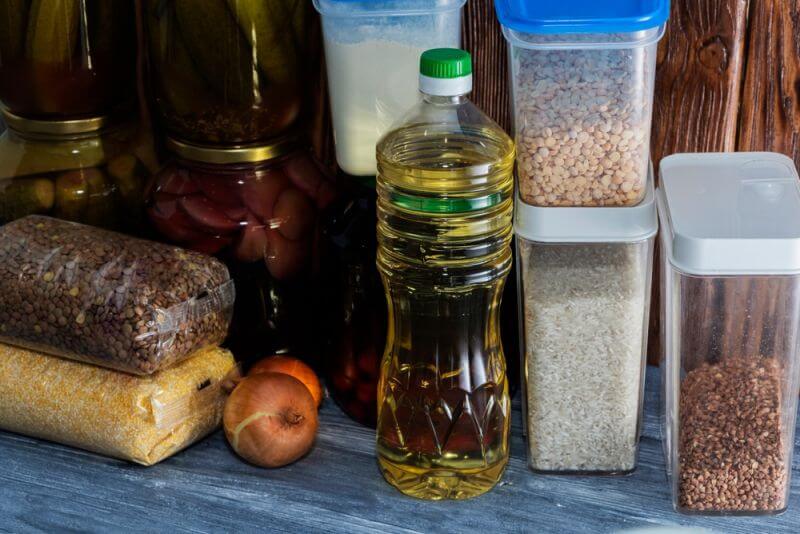Becoming a prepper may seem easy to some, who believe that having enough money to throw at it will suffice. However, from personal experience, I can tell you that prepping involves a lot of trial and error, and sometimes you need to learn from your mistakes and keep pushing forward.
Acquiring knowledge and staying up to date with the latest practices is also essential. Chances are, there are folks out there who have made the same mistakes as you, and perhaps their solutions are better than yours. We are a large community, and we should learn from each other as much as we can.
When stockpiling food for various emergencies, people often go with the classics since you can’t go wrong with those, right?
However, you can’t survive on rice, beans, and pasta alone; remember that “diversity” is the keyword when preparing your pantry.
In this article, I’ve listed a couple of foods that I’ve added to my pantry over the years. Some of these foods are grossly overlooked by folks, especially those who are new to prepping.
Consider these foods for your pantry
Since I’ve mentioned staples such as rice, beans, and pasta, here are a few foods that can fit into those categories:
Lentils
Lentils have a high protein and fiber content, essential minerals like iron and folate. This makes them valuable for preppers and survivaists since they have the ability to sustain health and energy levels during crises. They can be stored for 1-2 years in a cool, dry place without refrigeration, making them a reliable staple.
Kamut
Kamut, an ancient grain, is renowned for its protein density, fiber, and abundance of vitamins and minerals such as magnesium and zinc. It provides sustained energy and can be stored for several years in airtight containers, ensuring its nutritional integrity over time.
Millet
Millet, another ancient grain, offers a rich nutritional profile including protein, fiber, and essential nutrients. It is prized for its versatility in cooking and its ability to be stored for extended periods without significant nutrient loss, making it ideal for diverse meal preparation during emergencies.
Quinoa
Quinoa stands out for its complete protein profile, containing all nine essential amino acids, along with fiber, vitamins, and minerals. Its long shelf life and gluten-free nature make it a valuable addition to preppers’ food supplies, offering nutritional diversity and versatility in cooking options.
When it comes to beverages, water tops every list, as it should always be the priority. However, there are some powdered beverages that everyone should consider:
Powdered Milk
Powdered milk serves as a valuable source of protein, calcium, and vitamins A and D, crucial for maintaining overall health and well-being. Its long shelf life, often lasting up to 1-2 years or more when stored in a cool, dry place, makes it a reliable staple for extended periods of food scarcity or disruption.
Versatility is another key advantage of powdered milk. It can be reconstituted easily with water to create a substitute for fresh milk in cooking, baking, and beverage preparation. This flexibility allows preppers to maintain a varied and nutritious diet even when fresh dairy products are unavailable.
Instant Coffee
Instant coffee provides a quick and easy source of caffeine, boosting alertness and morale during stressful situations. Its long shelf life and compact packaging make it practical for storage and preparation without the need for specialized equipment.
Cocoa
Cocoa powder offers comfort and versatility, serving as a rich source of antioxidants and providing a familiar treat in challenging times. It can be used to make hot chocolate or added to baked goods, enhancing morale and providing a sense of normalcy.
Juice
Juice, especially those in shelf-stable or powdered forms, provides essential vitamins and hydration. It offers a refreshing and nutritious option for maintaining energy levels and replenishing fluids during emergencies. Shelf-stable juice packs can be stored for extended periods, ensuring availability when fresh beverages may not be accessible.
Note: It goes without saying that if you decide to store these powdered beverages you should plan ahead and calculate the amount of water that would be needed to prepare them. You will perhaps discover that making juice for your kids on a daily basis will have a certain impact on your water supply during a crisis.
Additional recommendations:
Nuts and Seeds
Nuts and seeds are rich in protein, healthy fats, vitamins, and minerals, providing essential nutrients for sustained energy and overall health. They have a long shelf life when stored in a cool, dry place, making them ideal for long-term storage and consumption during emergencies.
Nut Butters
Nut butters, such as peanut butter or almond butter, offer concentrated sources of protein, healthy fats, and vitamins. They can be stored for months to years without refrigeration and serve as convenient spreads or ingredients in recipes, providing essential nutrients and flavor.
Maple Syrup
Maple syrup is valued for its natural sweetness, antioxidants, and versatility in cooking and baking. It has an indefinite shelf life if stored properly and serves as a natural sweetener and flavor enhancer, adding nutritional value and comfort to meals and beverages.
Coconut Milk
Coconut milk, whether in powdered or canned form, is rich in nutrients such as healthy fats, vitamins, and minerals. It offers hydration, dietary diversity, and culinary versatility, serving as a dairy alternative in cooking, baking, and beverages during emergencies. Canned varieties can have a shelf life of up to 5 years.
Honey
Honey is often overlooked but highly valuable for emergency preparedness due to its nutritional benefits, versatility, and long shelf life. Firstly, honey is rich in antioxidants, vitamins, and minerals, providing essential nutrients that support overall health and immunity. It offers a natural source of energy from carbohydrates, making it a reliable food source during times of need.
In the kitchen, honey serves multiple purposes. It can be used as a natural sweetener in beverages, baking, and cooking, enhancing flavor while providing nutritional benefits. Its viscosity and antimicrobial properties also make it effective for topical applications, soothing sore throats and promoting healing of minor wounds and burns.
Freeze-Dried Fruits and Vegetables
Freeze-dried fruits and vegetables are excellent foods to stockpile for emergency preparedness, offering a range of benefits. They retain most of their original nutrients, including vitamins, minerals, and antioxidants, due to the gentle freeze-drying process. This method involves freezing the produce and then removing moisture through a vacuum process, resulting in lightweight, shelf-stable foods that maintain their nutritional integrity.
These foods have a significantly extended shelf life compared to fresh produce, often lasting years when stored properly in sealed containers. This longevity makes them a reliable source of essential nutrients during emergencies when access to fresh fruits and vegetables may be limited or unavailable.
Freeze-dried fruits and vegetables are lightweight and compact, making them easy to store and transport in emergency kits or stockpiles. They require minimal preparation—often only needing to be rehydrated with water—making them convenient for quick meals, snacks, or additions to recipes. Moreover, they offer versatility in cooking and meal preparation, whether eaten as snacks, added to cereals or yogurt, or incorporated into soups, stews, and casseroles to enhance flavor and nutritional content.
Powdered Eggs
Powdered eggs provide a stable source of protein, vitamins, and minerals essential for overall health. They have a long shelf life and can be reconstituted with water for use in various recipes, offering convenience and nutrition in situations where fresh eggs may not be available.
Yeast
Yeast is essential for baking bread and other baked goods, providing leavening and flavor. It can be stored in a cool, dry place for extended periods, allowing preppers to maintain homemade bread production and culinary variety during emergencies.
Vinegar
Vinegar, such as apple cider vinegar or white vinegar, serves multiple purposes in cooking, preserving, and cleaning. It has an indefinite shelf life and adds acidity and flavor to dishes, making it a valuable addition to emergency supplies.
Condiments
Condiments, such as salt, pepper, spices, and sauces, enhance flavor and nutrition in meals. They can be stored for extended periods and provide essential seasonings and culinary diversity, improving morale and satisfaction in emergency food preparation.
Stockpiling is just the first step
I’ve emphasized repeatedly that no matter what you choose to stockpile in your pantry, based on personal preferences, it’s crucial to find the time to cook with the ingredients you’ve stored. For instance, we’ve developed the habit of cooking exclusively from our survival pantry for a week at a time. During these periods, we meticulously note the recipes we try and any areas that need improvement.
You don’t have to be a master chef to prepare nourishing and tasty meals. There’s ample online assistance available, with numerous websites offering recipe ideas based on your available ingredients. For example, we frequently use supercook.com to discover new recipes. All you need is some basic cooking knowledge and the willingness to experiment with the recipes provided.
Now, if you’re stockpiling other foods that are rarely mentioned in survival literature, we encourage you to use the comment section and share those foods with us! We would love to hear from you!










